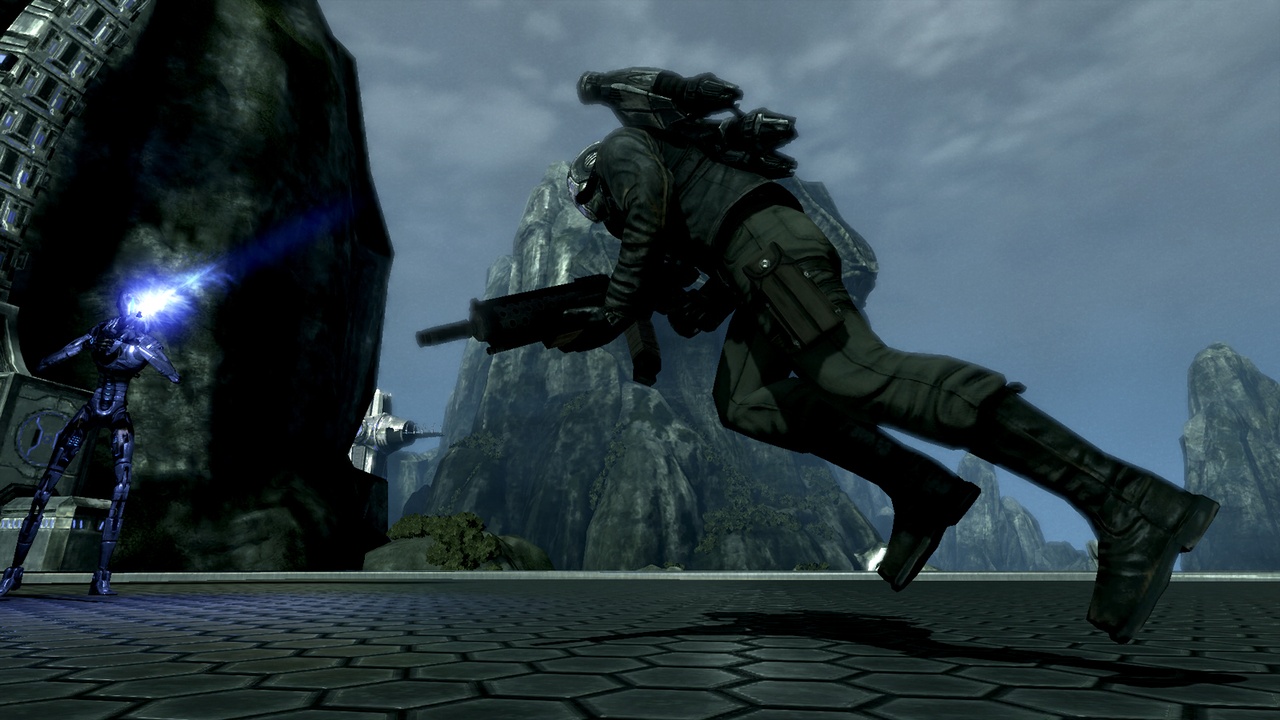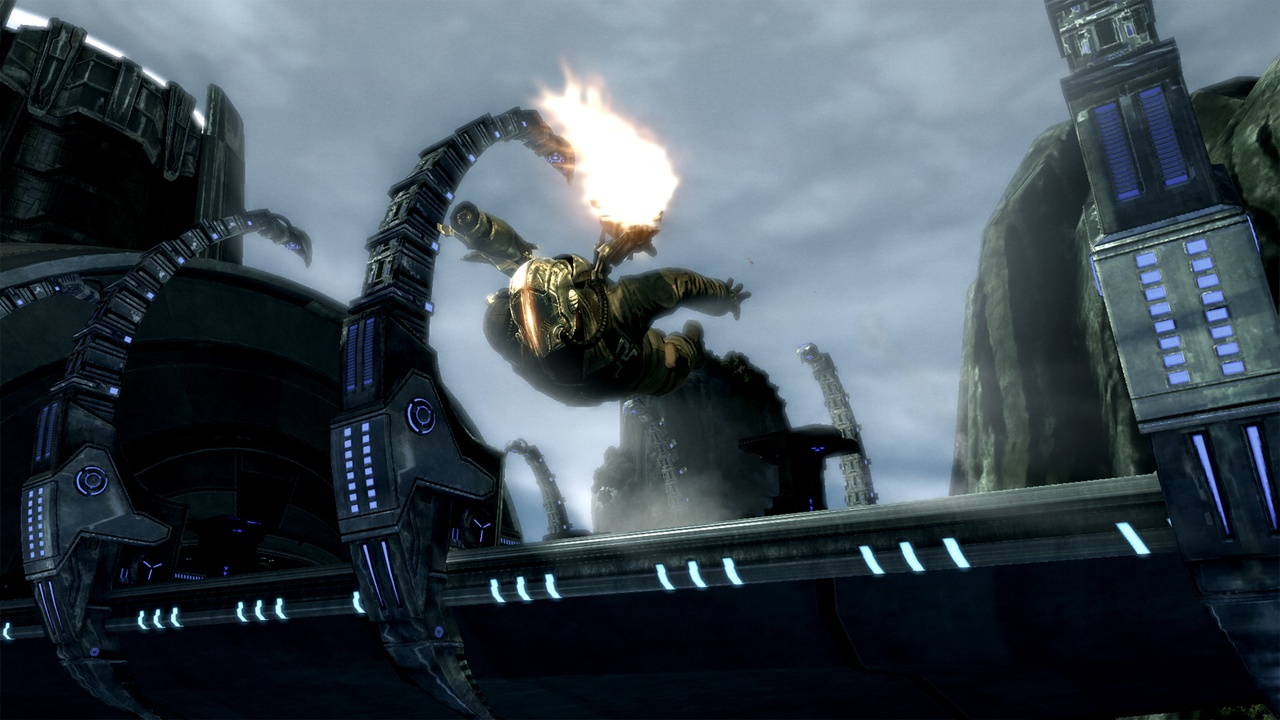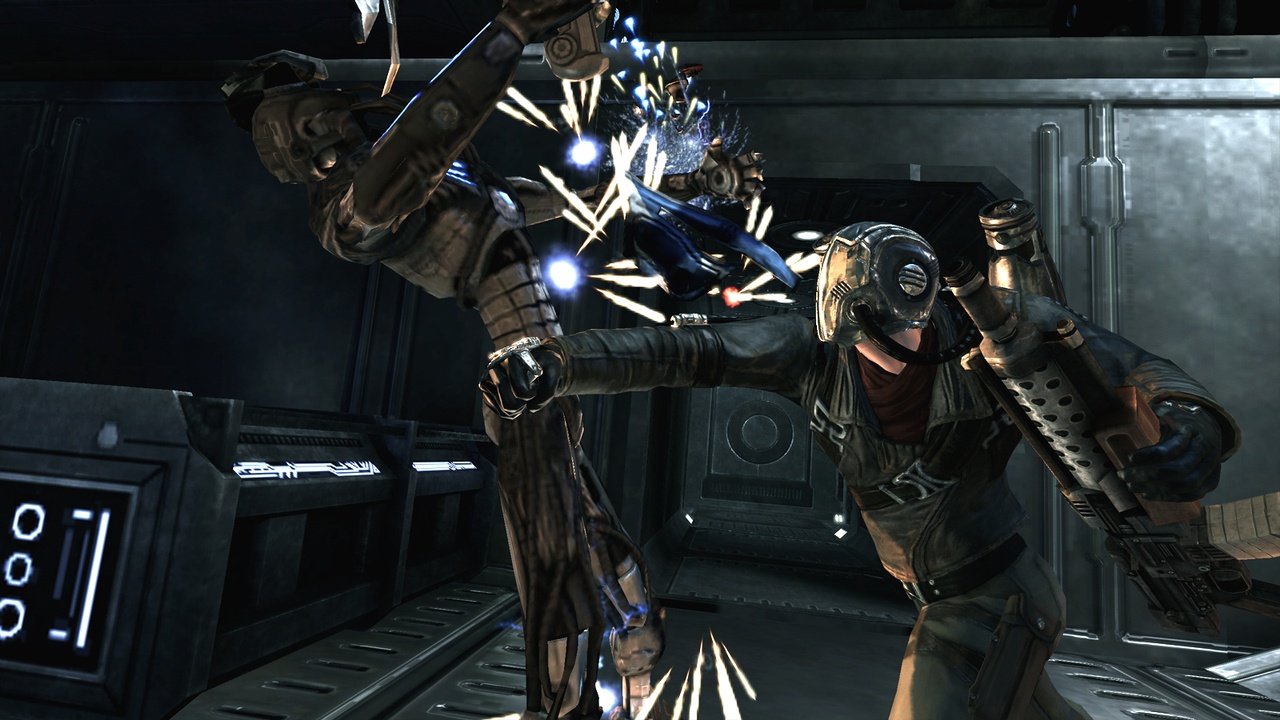Dark Void Q&A - The Music of Bear McCreary
We talk with Dark Void and <i>Battlestar Galactica</i> composer Bear McCreary about his work in Capcom's upcoming sci-fi shooter.
While Dark Void might not have the name recognition of other games in the Capcom library, it's generated a fair amount of buzz thanks to an intriguing combination of gameplay types. Developed by Airtight Games, Dark Void looks to offer a mix of cover-based combat, perspective-altering platforming, and ample flying. The man with the challenging task of scoring all those gameplay elements is Bear McCreary, better known as the composer of the new Battlestar Galactica TV series. We recently spoke with Bear about his role crafting music for the game.
GameSpot: You're best known for your work in Battlestar Galactica. How has the transition been from Battlestar to Dark Void?
Bear McReary: Well, it's been very exciting because not only is the medium different--I'm going from television to games--but the style of the music is actually quite different as well. So I've really gotten to explore new sounds that I haven't been able to use on Battlestar, so it's really exciting.
Why Are Video Game Adaptations Good Now? | Spot On Fallout 4 Next Gen Update Comparison Fallout 4 Steam Deck Verified Gameplay ALIEN: Rogue Incursion - Announcement Teaser Trailer Stellar Blade - 13 Things I Wish I Knew S.T.A.L.K.E.R. 2: Heart of Chornobyl — Official "Not a Paradise" Trailer Manor Lords - Official Medieval City Builder/RTS Launch Trailer Honkai: Star Rail - "Then Wake to Weep" | Version 2.2 Trailer Devil May Cry: Peak Of Combat | Dante: Blazing Tempest Gameplay Trailer SAND LAND — Official Launch Trailer Sea of Thieves Season 12: Official Content Update Video Stellar Blade - Hard Mode No Damage Gigas Boss Gameplay
Please enter your date of birth to view this video
By clicking 'enter', you agree to GameSpot's
Terms of Use and Privacy Policy
GS: From a creative perspective, is there anything you learned or tried out in the later seasons of Battlestar that you've carried over to Dark Void, or are you starting with a blank slate?
BM: I think that in the later seasons of Battlestar I learned things that I'm going to carry with me for the rest of my life, and certainly into Dark Void. The interesting thing about my score for Dark Void is not how it connects to my recent work, but for me it's how it's connected to older film scores. Dark Void gave me an opportunity to experiment with the orchestral language that I haven't been able to use on Battlestar, the kind of film scores that I used to love when I was growing up. So in many ways there's an element of this that feels very contemporary, and I think people who know my work from Battlestar will very easily be able to identify Dark Void as being my work. But there's also a grander orchestral presence. I really was a lot more inspired by Elmer Bernstein, and Jerry Goldsmith, and Bernard Herrmann, and even John Williams--these composers that traditionally worked in a more orchestral setting than I do on Battlestar.
GS: What sorts of elements in particular do you think people might recognize instantly as your own personal work versus elements that might take them by surprise?
BM: I'm not actually the best person to judge what defines my personal style, because I obviously can't listen to my music objectively. But the percussion riding is very intense. The score has a very tribal, energetic, aggressive sound. The drums are just mean and nasty. A lot of the same soloists that I work with on Battlestar and Terminator [The Sarah Connor Chronicles]--and all my projects, really--are also working on Dark Void. So you'll hear sounds that are musicians that I like to work with on everything I do. They're certainly part of the Dark Void sound. But there's also a lot of aspects of the Dark Void score that are, for me, totally unique.
GS: Going into this project, did you know much about the game itself, or were you more looking at Capcom's track record as one of the more successful and well-known publishers out there?
BM: I've been aware of Capcom as a company my entire life. I grew up playing Mega Man, Mega Man 2, Mega Man 3, and Mega Man 4, so just the idea of working with Capcom was really exciting. But aside from that, when I had my first meeting, I saw some of the early footage of the game. I saw some early production drawings, and that basically sold me. I can't say that I was entirely sold on doing any game. I've been waiting for the right game to score, and Dark Void was absolutely the right game. When I saw the design and found out the story, I knew this was something I could put music to. I knew that this was a universe that needed a really iconic, signature sound. Honestly, I knew that it would be fun, but I really didn't anticipate how much fun I would have writing this music. I really got to explore and let my creativity go crazy because I'm used to working against picture. Now, to be able to look at these drawings, and look at the characters, and listen to the ideas for the story, and just write music on my own without time constraints, this was very liberating for me.
GS: As you've seen the game in its varying states of completion, from original concept art on through the more completed state that it's in today, has that affected the sound that you've gone for? Has the sound evolved as the game has?
BM: I can't say that it has. And part of the reason that it hasn't really changed is that I did the bulk of my writing at a very early stage. There really wasn't much of the game for me to look at. I had gone up there, I had gone up to Airtight where it's being developed, and I got to play a little bit of it and see where it was going. I basically wrote the music imagining what I thought the game would look like. It was very incomplete. I had lots of production drawings. And I would say the production drawings were my biggest inspiration. After the score was finished, I started seeing more complete footage of gameplay, and I remembered thinking the footage is looking as good as the music sounds. In many ways, I wouldn't have written the music any other way. I feel like the music fits perfectly. I was scoring for very incomplete footage, which was fun.

GS: Was that much of a challenge compared to scoring for a TV show that's still going through the editing process?
BM: Initially, it was. I've got to admit, the first couple of days, I kind of sat in my studio and didn't know what to do. But once I made that leap and let myself go for it, it was not a challenge at all. If anything, it was liberating--that's the word I keep coming back to. It was liberating to write music without time constraints.
GS: Let's talk about the specifics of the sound for a bit. Why the decision to go with the orchestral score versus some of the synthesizer or spacey guitar effects you hear in a lot of science-fiction work?
BM: Well, I hate synth orchestra. I hate it. You'll never hear it in my projects. I'm always very concerned when I hear that in games especially. I'm a gamer, and I must say that my pet peeve is, I hear orchestra in the main title and a couple of big cues, but in a lot of video game music there's still fake orchestra all over the place. So in Dark Void, you're not going to hear that. Ever. There's live orchestra on virtually every cue, and on the cues that don't have live orchestra on them, there's just no orchestra. There's other instruments. And that's where I borrowed my philosophy from Battlestar, which has always been rather than doing synth orchestra, you write for whoever you have and whoever you can get to come in and play.
As for the orchestral side of it, I was a little nervous at first because I got hired, I think, because Battlestar was so successful. I'm very well known for a certain kind of sound. And when I looked at the project, I felt like it needed a bigger orchestral sound. I didn't think that the kind of sparse, minimal approach on Battlestar--although Battlestar isn't really sparse or minimal anymore--but certainly the thing that I thought I was known for wouldn't work on Dark Void. I remember speaking with the producers and the developers and saying, "I know why you hired me. I don't think that sound is going to work. I think that this needs to be bigger. I think that this game needs a sense of grandeur, it needs something that only the full orchestra can bring." And they went for it. In fact, my first demo went over great. It set the tone for what would become the most lyrical, adventurous, and honestly one of the most beautiful scores I've ever written. The use of themes in this game is the same way I approach film or TV. It's a very thematically interwoven score. My hope is that it's a very rewarding score. I want gamers, when they're done playing this, to be able to identify the themes for each character. To be able to identify the musical elements that are in the score, associated with the various parties and characters and places that you go. That kind of development isn't something that I hear in a lot of games. I really felt strongly, and still feel strongly, that a game is a long experience and anything I can do to make the experience more worthwhile and more entertaining, the better.

GS: One of the biggest challenges for you to put that into effect is the technological differences of the medium. In TV, you've got a set cue where the song will start playing at the same point every time. But in the game, it depends on the player's progress. A lot of times, if the player is moving slowly, he or she will be exposed to that song again and again and again. It loses its effectiveness as it repeats over and over. How have you dealt with that? I know you've toyed with the idea of resequencing different tracks so they play dynamically. Is that right?
BM: That's exactly what I was going to say. As the player takes the game slowly, it's not going to repeat. You're not going to hear the same thing over and over again. As the game goes on, the music will adapt and evolve in ways that, I hope, will keep players on their toes. Because I think that repetition in video games is a major problem in the experience. Ultimately, no matter how exciting a piece of music is, once you've heard it three or four times, it becomes comforting. It becomes something you settle into ... But in a game where you're supposed to be in danger, where you're in combat, it doesn't help to have the music become so familiar ... My goal is that when you play through a certain level, and if you play through it again, it wouldn't be exactly the same. It would be close, but not exactly the same. Not enough that you could predict what could happen, and it's that unpredictability that would heighten the experience.
GS: One of the other challenges that exists for you with this game is that one of the big selling points for Dark Void is that it's not a one-dimensional game. There are lots of different gameplay types: shooting, flying, rocketeering, dogfighting. What sorts of challenges does that pose for you as a composer?
BM: In the initial stages, it was an issue. When we were first talking about the game, they were telling me you could fight on foot, you could fight in the air, so the obvious decision was, let's have music for when you're on foot and music for when you're flying. Which is a nice intellectual idea, but in practice it didn't work. Unlike in a lot of other games, these different styles of gameplay are up to the player. The player can stop flying whenever he or she wants. So in order to do that, you'd have the music starting and stopping every five seconds if you wanted to fly and then walk, fly and then walk. So we threw that idea out the window. And what we did instead was, I approached it almost like a really long movie or miniseries. And I looked at it like one giant arc, because our character goes through a major shift from the beginning of the story to the end of the story. I approached it more thinking about what the character and ultimately what the player is going to be thinking about. So the combat at the beginning of the game is very sparse and mysterious, because you're in this strange new place. It's intense, but it's not crazy. It's more about the atmosphere. And as the game goes on, you start learning more about your environment, you start learning more about the other people there with you, and the score becomes more complex.

GS: Is there any type of video game genre, or story or themes, that you're interested in working on in the future outside of sci-fi action?
BM: Yeah. Honestly, there are so many games that would be fun, and so many genres. I'm a big fan of the Metal Gear Solid series. The thing I really admire about MGS4 was the time and attention that went into the cinematics in that. I know that a lot of people felt like it was too much, but I didn't think so. That idea that the cinematic part of it can be as much of the experience as the gameplay part of it is something that I find really interesting. Maybe that's not a genre necessarily, but a style of game that I find interesting would be something that has more in-depth cinematics ... Because as a composer, you get to do both--you get to do the cinema and you get to do the interactive quality. It just depends honestly on what comes my way.
GS: Thank you.
Got a news tip or want to contact us directly? Email news@gamespot.com
Join the conversation